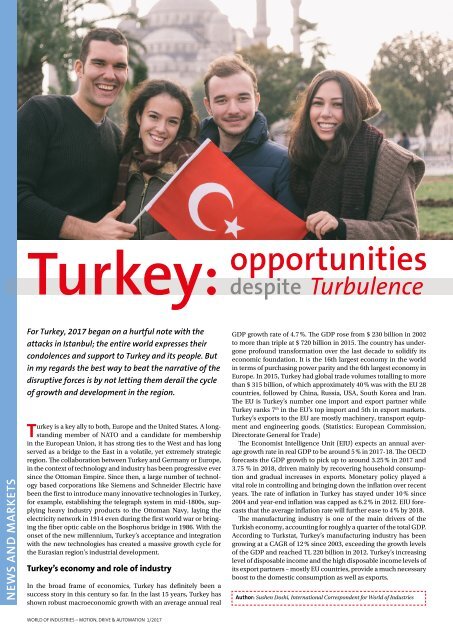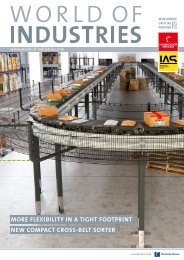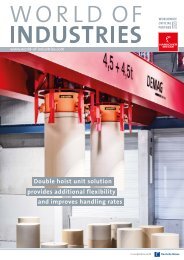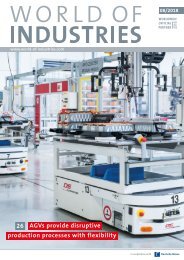WORLD OF INDUSTRIES - MOTION, DRIVE & AUTOMATION 1/2017
WORLD OF INDUSTRIES - MOTION, DRIVE & AUTOMATION 1/2017
WORLD OF INDUSTRIES - MOTION, DRIVE & AUTOMATION 1/2017
- TAGS
- mda
- automation
- industries
Create successful ePaper yourself
Turn your PDF publications into a flip-book with our unique Google optimized e-Paper software.
Turkey: opportunities<br />
despite Turbulence<br />
NEWS AND MARKETS<br />
For Turkey, <strong>2017</strong> began on a hurtful note with the<br />
attacks in Istanbul; the entire world expresses their<br />
condolences and support to Turkey and its people. But<br />
in my regards the best way to beat the narrative of the<br />
disruptive forces is by not letting them derail the cycle<br />
of growth and development in the region.<br />
Turkey is a key ally to both, Europe and the United States. A longstanding<br />
member of NATO and a candidate for membership<br />
in the European Union, it has strong ties to the West and has long<br />
served as a bridge to the East in a volatile, yet extremely strategic<br />
region. The collaboration between Turkey and Germany or Europe,<br />
in the context of technology and industry has been progressive ever<br />
since the Ottoman Empire. Since then, a large number of technology<br />
based corporations like Siemens and Schneider Electric have<br />
been the first to introduce many innovative technologies in Turkey,<br />
for example, establishing the telegraph system in mid-1800s, supplying<br />
heavy industry products to the Ottoman Navy, laying the<br />
electricity network in 1914 even during the first world war or bringing<br />
the fiber optic cable on the Bosphorus bridge in 1986. With the<br />
onset of the new millennium, Turkey’s acceptance and integration<br />
with the new technologies has created a massive growth cycle for<br />
the Eurasian region’s industrial development.<br />
Turkey’s economy and role of industry<br />
In the broad frame of economics, Turkey has definitely been a<br />
success story in this century so far. In the last 15 years, Turkey has<br />
shown robust macroeconomic growth with an average annual real<br />
GDP growth rate of 4.7 %. The GDP rose from $ 230 billion in 2002<br />
to more than triple at $ 720 billion in 2015. The country has undergone<br />
profound transformation over the last decade to solidify its<br />
economic foundation. It is the 16th largest economy in the world<br />
in terms of purchasing power parity and the 6th largest economy in<br />
Europe. In 2015, Turkey had global trade volumes totalling to more<br />
than $ 315 billion, of which approximately 40 % was with the EU 28<br />
countries, followed by China, Russia, USA, South Korea and Iran.<br />
The EU is Turkey’s number one import and export partner while<br />
Turkey ranks 7 th in the EU’s top import and 5th in export markets.<br />
Turkey’s exports to the EU are mostly machinery, transport equipment<br />
and engineering goods. (Statistics: European Commission,<br />
Directorate General for Trade)<br />
The Economist Intelligence Unit (EIU) expects an annual average<br />
growth rate in real GDP to be around 5 % in <strong>2017</strong>-18. The OECD<br />
forecasts the GDP growth to pick up to around 3.25 % in <strong>2017</strong> and<br />
3.75 % in 2018, driven mainly by recovering household consumption<br />
and gradual increases in exports. Monetary policy played a<br />
vital role in controlling and bringing down the inflation over recent<br />
years. The rate of inflation in Turkey has stayed under 10 % since<br />
2004 and year-end inflation was capped as 6.2 % in 2012. EIU forecasts<br />
that the average inflation rate will further ease to 4 % by 2018.<br />
The manufacturing industry is one of the main drivers of the<br />
Turkish economy, accounting for roughly a quarter of the total GDP.<br />
According to Turkstat, Turkey’s manufacturing industry has been<br />
growing at a CAGR of 12 % since 2003, exceeding the growth levels<br />
of the GDP and reached TL 220 billion in 2012. Turkey’s increasing<br />
level of disposable income and the high disposable income levels of<br />
its export partners – mostly EU countries, provide a much necessary<br />
boost to the domestic consumption as well as exports.<br />
Author: Sushen Doshi, International Correspondent for World of Industries<br />
<strong>WORLD</strong> <strong>OF</strong> <strong>INDUSTRIES</strong> – <strong>MOTION</strong>, <strong>DRIVE</strong> & <strong>AUTOMATION</strong> 1/<strong>2017</strong>
















